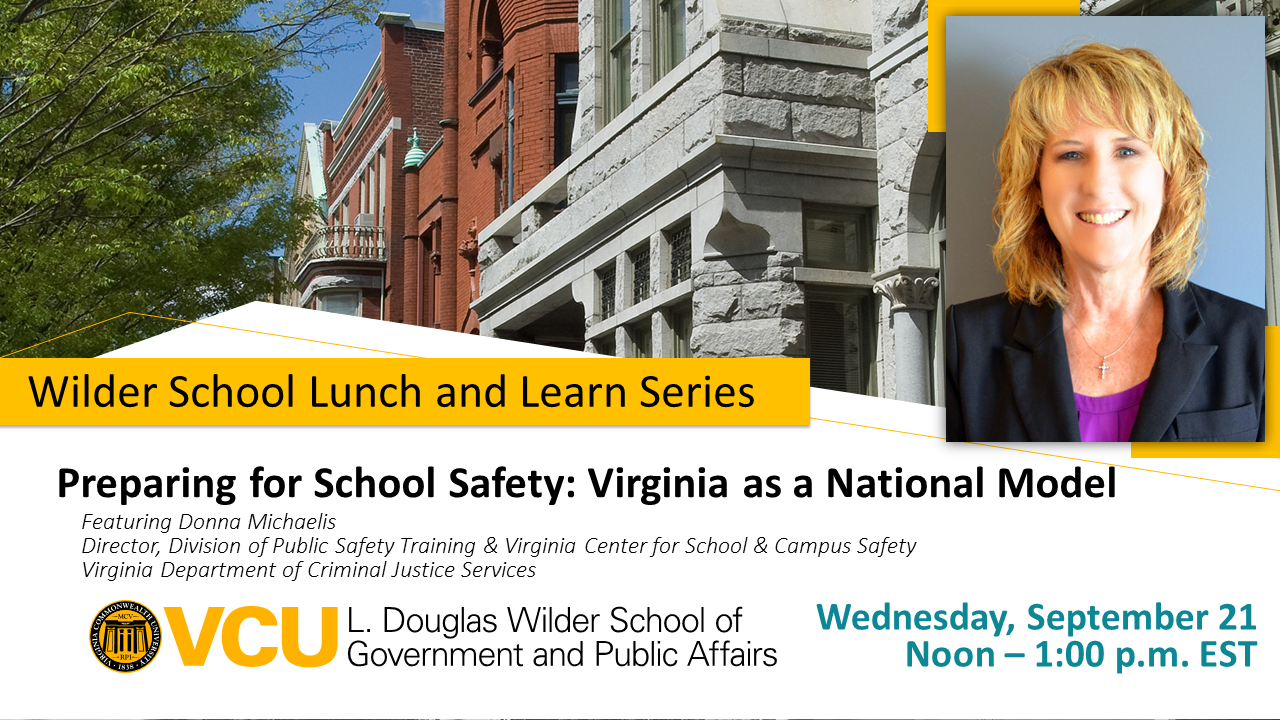News
Wilder School Lunch and Lunch explores school safety

How can schools more effectively respond to mass shootings and firearm violence? What does it take to successfully plan and implement programs to prepare and train teachers, administrators and students? These are questions Donna Michaelis answered during a discussion on best practices to plan for and respond to emergencies in Commonwealth schools. She shared a Virginia-based public safety model that can be adopted nationwide.
>>Watch the Lunch and Learn presentation on the Wilder School YouTube channel
“We've all have children or no children or are related to people that have children in our public schools, grandchildren, stepchildren, and we all put them on the bus and expect them to come home to us safely,” Michaelis said.
“We've all have children or no children or are related to people that have children in our public schools, grandchildren, stepchildren, and we all put them on the bus and expect them to come home to us safely.” –Donna Michaelis
Preparing for the unexpected
Shortly after the tragic events of Columbine High School in 1999, which brought mass school shootings into the public spotlight, the Virginia Center for School and Campus Safety (VCSCS) was established by the Virginia Department of Criminal Justices Services. Through the passage of comprehensive legislation, Michaelis and her team have successfully mandated annual threat assessments, crisis management programs and annual surveys across Virginia public schools. They’ve also developed law enforcement school partnerships programs to build community relationships.
VCSCS has implemented mental health, self-harm and suicide prevention programming as well as training for recognizing and responding to victim trauma. Greater awareness and sensitivity to students’ issues as home and intervention efforts are all designed to intervene when individuals display behaviors and actions that could lead to criminal activity. Michaelis noted that transitional adolescence brings unique threats before students have developed social skills that help them deal with conflict.
While the goal is to keep students out of the criminal justice system, other intervention becomes necessary.
“Sometimes you need the lever of a diversion program or a court mandate in order to get parents and others involved, and take seriously what's going on in the students' lives, and that happens with law enforcement,” said Michaelis.
Perceptions of safety
Annual survey data has helped VCSCS monitor student and teacher perceptions of safety, which is used to gather information on program effectiveness and make continual improvements. Schools have also adopted student record management systems that track data to learn from and more effectively manage threat assessment cases. VCSCS also collects and disseminates school policies and best practices. Surveys overwhelming reveal that students feel safe in school and know what to do if there is an emergency.
Michaelis and her team also conduct a digital mapping program where schools can contract to have their buildings mapped at no cost. The schools share the map data which is added to the VCSCS database.
These programs and tools have drawn the attention of other states and in 2019 VCSCS launched the National Threat Assessment Conference to share its models at the national level. As more and more states look for effective and proven threat prevention models, Virginia’s committed resources and decades of planning are leading the country in improving school safety.
About the speaker:
Donna Michaelis is the Director of the Division of Public Safety Training and the Virginia Center for School and Campus Safety at the Virginia Department of Criminal Justices Services. She has worked in the area of school safety since 1985 when she began her career with the Chesterfield County Police Department as the county’s first Child Safety Coordinator. In 1998, she joined the Virginia Department of Criminal Justice Services as a Youth Safety Specialist in charge of school resource officer training. Mrs. Michaelis assumed the responsibility of the newly legislated Center at DCJS when it was established in 2000 as a result of the Columbine School tragedy. In her role, she provides training, resources, and technical assistance to all schools, colleges and universities, and law enforcement agencies across the Commonwealth on issues related to school and campus safety and specialized law enforcement. Mrs. Michaelis is a graduate of the College of William and Mary in Williamsburg, VA.
About the moderator:
Hayley Cleary, M.P.P., Ph.D., is an Associate Professor of Criminal Justice and Public Policy at Virginia Commonwealth University. She holds undergraduate degrees from the University of Virginia and a Master of Public Policy and Ph.D. in Developmental Psychology from Georgetown University. Cleary's research interests lie at the intersection of social science, law and policy. Her work examines adolescent behavior and decision-making in justice system contexts, including youths’ contact with law enforcement, courts and corrections. The cornerstone of her research program involves police interrogation of juvenile suspects. Her research has been funded by the National Science Foundation and the Annie E. Casey Foundation. Cleary’s work has been featured in national media outlets, including the New York Times and New Yorker magazine, and she was named the 2018 Louise Kidder Early Career Award winner for contributions to social issues research by the Society for the Psychological Study of Social Issues. Cleary has been invited on numerous occasions to share her work with academic, law enforcement, and attorney audiences, including the FBI National Academy, the Virginia state legislature, and attorney organizations in several states.